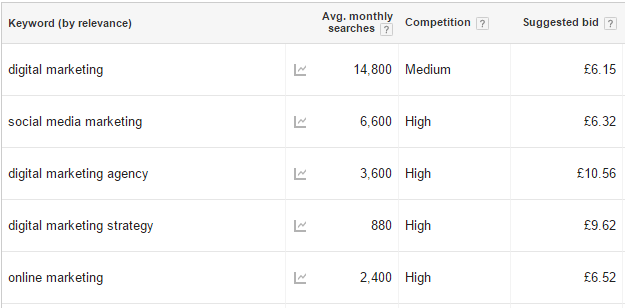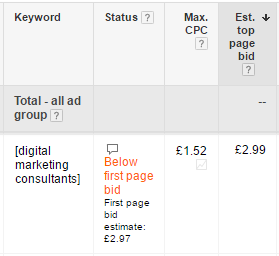Two Unforgivable Reasons For Abandoning Google Adwords
Many SMEs are interested in Google Adwords advertising. They envisage their ad being listed at the top of page 1 within an hour of the campaign going live, and anticipate the conversions rolling in within two.
OK that might be a little bit of an exaggeration, but here’s a genuine conversation I had recently with a new client who was dead against Adwords based on their experience.
We stopped our Google Adwords campaign. We spent £50 a day and got nothing from it. Each click was £7! - And how long did you run it for? I asked - Five days - it was so expensive and we didn't think it was worth it so we don't want to try it again.
And that makes me cross. This small business had high hopes of Google Adwords and unfortunately employed someone who set up a campaign without taking into account the company’s objectives:
- they set up a daily budget in excess of what the company wished to pay
- they bid on high cost keywords without delving deep to find cheaper, relevant keywords
Unsurprisingly this SME abandoned Google Adwords advertising far too soon because of two unforgiveable surmountable reasons:
- They found it too expensive
- They believed they had NO sales attributable to the Adwords campaign
1. Google Adwords Are Expensive
With Adwords, you control your budget. If you set a budget at £50 a day, Google is well within its rights to spend £50 a day. So abandoning a Google Adwords campaign because you have spent more than you wanted is just nonsense.
Set a budget that suits you!
If you want to set a modest budget, how should you approach things?
1.1 Daily Budget
Set a daily budget that equals what you are prepared to pay. In many instances you won’t even match the daily budget, but it protects your expenditure so you can budget accordingly.
When setting the budget, do take into account the value of each sale that could result from your Adwords campaign. For example if you spend £20 a day, with low price keywords, and get 2 conversions a week, resulting in sales of £500, things are looking good.
1.2 Keyword Choice
There’s no need to bid on high CPC (cost per click) keywords if you do your keyword research correctly. Using a tool such as Adwords Keywords Planner you must identify relevant keywords that have a mid range monthly search for your target location and language (say 500-1000 per month) and have a medium or low competition.
This search shows some competitive keywords around the term “digital marketing”. There are a good number of monthly searches but suggested bids are all above £6.
By finding alternative search terms (reduced monthly search / low competition) means:
- your budget won’t be eaten up by one or two high monthly search words
- you’ll pay less for clicks on lower competition words
1.3 Max CPC (Cost Per Click)
To keep a tight rein on expenditure, set the maximum amount you want to pay for each click on your advert. If you want to spend no more than £10 a day, there’s no point setting a max CPC at £7 – potentially 1 click and your daily budget is spent.
Adwords will helpfully show if your max CPC is too low for your advert to show on the first page of the results:
In this instance, either up the max CPC or pause that keyword and focus on other cheaper options.
The choice is yours – because YOU control the expenditure in Google Adwords advertising.
1.4 Time
It’s also worthwhile noting that until Google gathers data on your campaign, it can’t really measure the “quality” of the keywords and how well they relate to the adverts and landing page. After a while Google will assign a “quality score” to each phrase.
Quality scores range from 1 to 10 – and the higher your score, the less you’ll pay for each click.
That’s why it’s essential to not bail out of a (well set up) Google Adwords campaign too soon, and why you need to monitor any new campaigns carefully in the first few weeks to optimise and boost that quality score.
2. Google Adwords Don’t Result In Sales
If we go back to my new client who is wary of Adwords, then how did they monitor sales generated from the original campaign?
They didn’t.
They hadn’t set up conversions properly in their Adwords campaigns. They weren’t tracking conversions directly attributable to the Adwords ads, namely:
- phone calls from the advert call extensions
- phone calls from the website
- completed sign up forms
- purchases
Their defence was that they normally received 5 to 10 phone calls daily, and the Google Adwords campaign showed no increase in that number.
But hey, imagine one day, five calls were from “normal” sources and five were from the Adwords campaign. And two of the latter went on to become sales.
I’d say that was a great result after only a few days.
2.1 Conversion Monitoring
If you don’t set up conversions in your Google Adwords, you’re shooting in the dark. You may see that 500 people clicked on your ad and that those clicks cost you say £500. But did it result in a lead? a newsletter sign up form? a sale?
You know nothing….
Until you set up conversion tracking in Adwords you won’t know for sure whether your campaigns are working. And abandoning your Adwords campaign before you have this data is very short sighted
3. In summary
Google Adwords advertising is a very powerful digital marketing tool . But if campaigns are not set up properly, in line with a company’s objectives and budget, you will find them stupidly expensive and ineffective
But before abandoning ship, I vote you revisit how you control your budget and how you measure conversions….. and once you have this data, you can build on it, hone your campaigns to perfection and see new clients rolling in.
If you want help with your Google Adwords advertising campaign or with any other aspect of digital marketing, please feel free to drop us a line.





Naomi
Really interesting and helpful